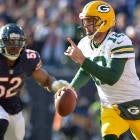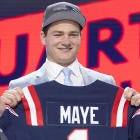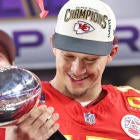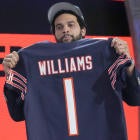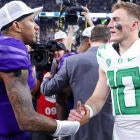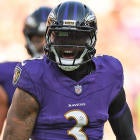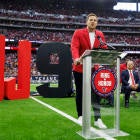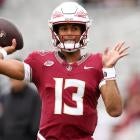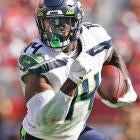The definition of a rivalry is a "competition for the same objective or for superiority in the same field." But beyond competing for the same prize, rivalries often include high intensity and bad blood on both sides of the field. They also typically include passionate fan bases that desperately want to hold bragging rights over the opposition.
While there have been a host of compelling playoff rivalries that have developed over the years, the NFL's longest rivalries have been divisional matchups. The frequency in which the teams play one another, along with the rivalries that have developed with competing cities, has helped make several divisional matchups some of the best rivalries the league has to offer.
With the start of the 2020 season just around the corner, we decided to look back at the NFL's 10 greatest division rivalries. We are limiting each team to one rivalry on this list.
10. Chargers vs. Broncos
Overall series lead: Broncos, 68-52-1
Playoff series lead: Broncos, 1-0
Longest winning streak: 7 (Broncos, 1975-78)
One of the AFL's best teams during the league's first several seasons, the Chargers, winners of the 1963 AFL championship, posted a 15-5 record against the Broncos prior to the AFL-NFL merger of 1970. The Chargers, who appeared in five AFL title games during a six-year span, were led by Hall of Fame receiver Lance Allworth, who led the AFL in receiving yards and touchdown receptions on three different occasions.
Denver flipped the rivalry on its head in the '70s, winning 11 of 12 games during one stretch that included a series sweep of the Chargers en route to their first Super Bowl appearance in 1977. The Broncos' "Orange Crush" defense, led by Tom Jackson, Lyle Alzado and Randy Gradishar, would eventually have its hands full with the Chargers' "Air Coryell" offense, led by quarterback Dan Fouts, John Jefferson, Charlie Joyner and Kellen Winslow. With its offense leading the way, San Diego won seven of 10 matchups against Denver from 1978-82 while making consecutive trips to the AFC title game in 1980 and 1981.
The arrival of John Elway in Denver in 1983 shifted the balance of power back to Denver, who went 22-10 against the Chargers during Elway's 16 seasons with the Broncos. While the Broncos became one of the NFL's most consistent winners with Elway at quarterback (Denver won three AFC titles in the '80s before winning their first two Super Bowl titles in 1997 and '98), the Chargers also tasted some success during that time, winning four of six games against Denver from 1992-95 while punching the franchise's first Super Bowl ticket in 1994. The Chargers' best player during this time was linebacker Junior Seau, who earned induction into the Pro Football Hall of Fame in 2015.
Denver continued having the upper hand in this series until Philip Rivers became the Chargers' starting quarterback in 2006. With Rivers, Hall of Fame running back LaDainian Tomlinson, tight end Antonio Gates and linebacker Shawne Merriman, San Diego won nine of its 11 games against the Broncos from 2006-11. Denver flipped the script after signing Peyton Manning during the 2012 offseason, as Manning's Broncos won eight of their nine matchups against San Diego that included their 2013 playoff victory over Rivers and the Chargers. This rivalry should be one to keep an eye on in the coming years, with both teams ushering in new eras with Drew Lock and Justin Herbert under center.
9. Falcons vs. Saints
Overall series lead: Falcons, 53-49
Longest series winning streak: 10 (Falcons, 1995-99)
While this matchup has typically failed to generate national attention, the Falcons-Saints rivalry has been one of the NFL's most intense matchups since the teams began playing each other in 1967. Despite nine- and 10-game winning streaks, the Falcons only have four more wins in this series, as the Saints have made significant headway since hiring Sean Payton in 2006 and acquiring quarterback Drew Brees during the same offseason. Since then, the Saints are 18-9 against the Falcons, including wins in four of their last five matchups. Atlanta has had its moments against New Orleans in recent years, however, as the Falcons' 2016 Super Bowl run included a season sweep of the Saints.
The most famous game between the two teams took place in 2006, when the Saints, playing their first game in the Superdome since Hurricane Katrina, defeated Michael Vick and the Falcons on "Monday Night Football." Steve Gleason's blocked punt, which resulted in the game's first touchdown, spearheaded the Saints to a 24-3 win that galvanized the entire state of Louisiana. The win also signaled the start of the greatest run of success in franchise history, as the Saints would advance to the NFC Championship Game that season before winning their first Super Bowl three years later.
Payton and Brees helped turn around a rivalry that had been dominated by the Falcons during the previous decade, specifically from 1995-99. The Falcons, led by quarterback Chris Chandler, running back Jamal Anderson, receivers Tony Martin and Terance Mathis, linebacker Jessie Tuggle and cornerback Ray Buchanan, swept the Saints during the '98 regular season en route to advancing to the franchise's first Super Bowl.
8. Bills vs. Dolphins
Overall series lead: Dolphins, 61-50-1
Playoff series lead: Bills, 3-1
Longest winning streak: 20 (Dolphins, 1970-79)
An old AFL rivalry, the Dolphins won just three of their first eight matchups against the Bills before Don Shula arrived in Miami in 1970. The arrival of Shula marked the beginning of the Dolphins' dynasty as well as their decade-long dominance over the Bills, as Miami did not lose a single game against Buffalo from 1970-79. The Dolphins, who won two Super Bowls and three AFC championships over that span, were a major reason why O.J. Simpson and the Bills made just one playoff appearance during the decade.
The Dolphins continued to control the rivalry until the late '80s, when the Bills, led by head coach Marv Levy and fellow Hall of Famers Jim Kelly, Thurman Thomas, Andre Reed and Bruce Smith, went 17-4 against the Dolphins from 1987-1995. While Buffalo won four AFC titles over that span, it also played a significant role in denying Shula and Hall of Fame quarterback Dan Marino from making a return trip to the Super Bowl after appearing in the big game together in January of '85. The Bills won all three of their playoff matchups over the Dolphins during this span that included an upset win over Miami in the 1992 AFC Championship Game. Marino and company did get a little payback in the 1998 playoffs, with the Dolphins edging the Bills in overtime in the wild card round.
Both teams have pretty much traded wins over the past two decades, with Buffalo holding a 22-18 advantage during this millennium. With Tom Brady now out of New England, the Dolphins and Bills should have more opportunities to play each other with division title and playoff implications on the line over the next several years.
7. 49ers vs. Rams
Overall series lead: 49ers, 71-67-3
Playoff series lead: 49ers, 1-0
Longest winning streak: 17 (49ers, 1990-99)
These two teams began playing on an annual basis in 1950, and while the rivalry lost some steam after the Rams moved from Los Angeles to St. Louis in 1995, things have picked up since the Rams returned to the City of Angels in 2016. Since 2017, the Rams have been one of the league's most successful teams, winning two division titles and an NFC title over that span. The 49ers have also emerged as one of the NFL's elite teams, as they swept the Rams in 2019 before winning the franchise's first NFC crown since 2012. Led by young coaches in Kyle Shanahan and Sean McVay, the 49ers and Rams should continue to battle for divisional and NFC supremacy over the next several years.
In the 1960s, the 49ers, led by perennial Pro Bowl quarterback John Brodie, and the Rams, who were led by their famed "Fearsome Foursome" defensive line, traded wins while denying each other the chance at competing with the Packers for NFL championships. The Rams began to take control of the rivalry in the late '60s, as they went 23-3-1 against the 49ers from 1967-80. Led by Hall of Famers Jack Youngblood and Jackie Slater, the Rams won eight consecutive division titles from 1973-80 that included a thrilling battle (albeit in a losing effort) against the Steelers in Super Bowl XIV.
While the Rams continued to field very successful -- and talented -- teams in the 1980s, they were no match for the 49ers who, under Hall of Fame head coach Bill Walsh, became one of the greatest teams in pro football history. With Joe Montana under center, Jerry Rice on the outside, Roger Craig in the backfield and Ronnie Lott manning the defense, the 49ers won four Super Bowls over a nine-year span while compiling a 13-8 record over the Rams during the '80s. San Francisco's run of success over Los Angeles during this span included its 30-3 win over the Rams in the '89 NFC title game, the first and only postseason matchup between these two teams.
The 49ers' dominance over the Rams continued into the 1990s, with San Francisco winning 17 straight games over their divisional foe while adding one more Lombardi Trophy to their collection in 1994. The Rams, however, turned the tables in 1999, sweeping the 49ers before winning the franchise's first Lombardi Trophy. In a documentary about the '99 Rams, former Rams quarterback Kurt Warner said the team's first win over the Rams that season convinced his team that they were indeed good enough to compete for a Super Bowl that season.
6. Jets vs. Patriots
Overall series lead: Patriots, 67-54-1
Playoff series lead: Patriots, 2-1
Longest winning streak: 9 (Jets, 1966-70)
The Jets and Patriots have played each other on an annual basis since 1960, when both teams were expansion franchises in the newly formed American Football League. After an early run of success by the Patriots, the Jets dominated the rivalry from 1966-1975, going 17-2-1 against the Patriots over that span. The Jets, led by Hall of Fame quarterback Joe Namath, swept the then Boston Patriots during the '68 season before leading the Jets to a shocking upset win over the NFL champion Colts in Super Bowl III.
The rivalry began to shift in the late '70s, when the Patriots, led by future Hall of Famers in lineman John Hannah and cornerback Mike Haynes, had an 8-2 record over the Jets from 1976-80. The teams were on equal footing by the mid '80s, when they faced each other in the postseason for the first time during the 1985 playoffs. And while the Jets' defense, nicknamed "The New York Sack Exchange," held the Patriots' offense to just 12 first downs and 258 total yards, four turnovers ultimately led to the Jets losing at home to the eventual AFC champions, 26-14.
Neither team could grab control of the rivalry over the next decade until Robert Kraft bought the Patriots in 1993. Kraft's purchase of the Patriots signaled the beginning of New England's dominance in not only this rivalry, but throughout the NFL. Since 1993, the Patriots are 38-18 against the Jets, and 31-11 against them since Bill Belichick became the team's head coach in 2000. Belichick actually lost his first three games against the Jets, including the game that saw Jets linebacker Mo Williams knock out Drew Bledsoe in Week 2 of the 2001 season. Bledsoe's replacement, Tom Brady, would go onto lead the Patriots to their first of six Super Bowl wins later that season. Among Brady's many victories over the Jets includes New England's 37-16 win over New York in the 2007 playoffs.
Despite their recent struggles against the Patriots, the Jets have managed to do a few things to add considerably more bad blood to the rivalry. Rex Ryan and the Jets' shocking 2010 playoff upset over the Patriots is still a sore subject for New England fans, while Eric Mangini's exposing of the Patriots' illegal video recordings has put a black eye on the Patriots' dynasty. The controversy regarding Bill Parcells' exit from New England to become the Jets coach, along with Parcells' initial refusal to allow Belichick to leave the Jets to join the Patriots in 2000, has only added to the bad feelings that exist between these two franchises and fanbases.
5. Redskins vs. Giants
Overall series lead: Giants, 103-69-4
Playoff series lead: Even at 1-1
Longest winning streak: 11 (Redskins, 1971-76)
One of the longest-running rivalries in the NFL, the Giants and Redskins first faced off way back in 1932. The teams battled for the first time in the postseason in 1943, when Hall of Fame quarterback Sammy Baugh and the rest of the Redskins shut out the Giants before falling to the Bears in the NFL Championship Game. New York, however, would take control of the rivalry by the end of the decade. From 1949-64, the Giants went 25-5-1 against the Redskins. In the process, the Giants, led by Hall of Famers Frank Gifford and Sam Huff, won their fourth NFL title in 1956 while becoming one of pro football's most popular teams. New York would continue to have the upper hand in the rivalry until 1971, when George Allen led the Redskins to 11 straight victories over the Giants. Washington also advanced to its first Super Bowl under Allen at the end of the 1972 season.
The rivalry really took off in the '80s, when Joe Gibbs and Bill Parcells roamed the sidelines in Washington and New York. During their eight seasons against one another, Parcells' Giants enjoyed an 11-6 record over Gibbs and the Redskins that included a 17-0 victory in the 1986 NFC Championship Game. A year after watching New York hoist the Lombardi Trophy, Gibbs and the Redskins swept Parcells' Giants in 1987 en route to a rout of Denver in Super Bowl XXII. Washington's run of success over New York wouldn't last long, however, as the Giants won their last six games against the Redskins with Parcells as their coach. Parcells' Giants won two Super Bowls during that span, while Gibbs would lead Washington to four NFC titles and three Super Bowl wins.
New York has mostly had the upper hand in the rivalry over the past quarter century, posting a 31-18-1 record against Washington since the start of the 1995 season. The Giants have won two more Super Bowls and three more NFC titles over that span, while the Redskins' Super Bowl drought currently stands at 28 years. Both teams are ushering in new eras in 2020, with Joe Judge taking over in New York and Ron Rivera now on the sideline in Washington. Both are also hoping that their young quarterbacks, Washington's Dwayne Haskins and New York's Daniel Jones, can be the cornerstone for future championship teams.
4. Chiefs vs. Raiders
Overall series lead: Chiefs, 67-53-2
Playoff series lead: Chiefs, 2-1
Longest winning streak: 9 (Chiefs, 2003-07)
It didn't take long for the Raiders and Chiefs to become bitter rivals after both teams broke into the AFL in 1960. By 1966, the teams were competing to become the first to represent the AFL in the Super Bowl. The Chiefs, after splitting their season series with the Raiders, captured the AFL title that season before falling to the Packers in Super Bowl I. The Raiders followed suit the following year, defeating the Chiefs twice during the regular season before falling to Green Bay in Super Bowl II. The Chiefs finally did win the big one in 1969, defeating the Vikings in the last game before the AFL-NFL merger.
But after the Chiefs began losing key members of their championship teams (most notably quarterback Len Dawson, running back Mike Garrett, receiver Otis Taylor, defensive end Bobby Bell and linebacker Willie Lanier), the Raiders began to take control of the rivalry while building a championship team of their own. From 1973-78, the Raiders went 10-1 against the Chiefs. In the process, the Raiders, coached at that time by John Madden, advanced to five consecutive AFC title games that including a win over the Vikings in Super Bowl XI. The Raiders' championship run was spearheaded by Hall of Famers Kenny Stalber, Fred Biletnikoff, Gene Upshaw, Art Shell, Dave Casper, Willie Brown, and Ted Hendricks.
After winning two more Super Bowls at the start of the '80s, the Raiders finally lost control of the rivalry at the close of the decade. Two of the biggest reasons for the shift of power in the rivalry was Marty Schottenheimer and Marcus Allen. With Allen --- a former Super Bowl and league MVP with the Raiders -- mostly watching from the sideline, the Chiefs defeated Los Angeles in the 1991 playoffs. Two years later, Allen, after an unceremonious ending in Los Angeles, signed with the Chiefs. With Allen now paired with fellow free agent signing Joe Montana, the Chiefs swept the Raiders en route to an AFC Championship Game appearance. The following season, Allen, who went 9-1 against his former team, led the Chiefs to a win over the Raiders during their final home game at the Los Angeles Memorial Coliseum. And while he never won a Super Bowl in Kansas City, Schottenheimer did win 18 of his 21 games against the silver and black.
While the Raiders have had their moments, the Chiefs have pretty much had control of the series over the past two decades. With Andy Reid on the sidelines, the defending Super Bowl champion Chiefs are 13-1 against the Raiders, who are surely hoping that a change of scenery (the team moved from Oakland to Las Vegas this offseason) will help turn the tide in this series.
Marcus Allen brought a new dynamic to the #Chiefs vs. #Raiders rivalry.
— Kansas City Chiefs (@Chiefs) December 12, 2014
Full Episode: http://t.co/GFuILbt471https://t.co/M5CmFtlEdo
3. Ravens vs. Steelers
Overall series record: Steelers, 28-24
Playoff series record: Steelers, 3-1
Longest winning streak: 5 (Steelers, 1997-99 and 2001-03)
While it hasn't had much time to blossom, the Steelers-Ravens rivalry, not even 24 years old, has already become arguably the greatest division rivalry in the NFL. After moving from Cleveland to Baltimore in 1996, the Ravens shortly replaced the Browns as the Steelers' biggest rival within the then AFC Central Division.
The rivalry reached a new level in 2000, when the Ravens won their first Super Bowl behind a dominant defense led by Ray Lewis and former Steelers great Rod Woodson. The following season, Pittsburgh won a late season game in Baltimore to capture the division title. In the second round of the playoffs, the Steelers dethroned the Ravens by featuring their own dominant defense, led by Joey Porter, Casey Hampton, Aaron Smith and rookies Kendrell Bell and Aaron Smith.
Baltimore finally got the upper hand over Pittsburgh in 2006, when the Ravens swept the season series while outscoring the Steelers 58-7. Baltimore's dominance over the Steelers wouldn't last long, however, with James Harrison's coming out party happening at the expense of the Ravens during Pittsburgh's 2007 regular season victory over Baltimore. The following season, the Steelers would win all three of their meetings against the Ravens that included thrilling victories in Baltimore in Week 15 and at home during the AFC Championship Game. With rookie quarterback Joe Flacco and the Ravens threatening to take the lead late in the game, a pick-six by Hall of Fame safety Troy Polamalu clinched Pittsburgh's second trip to the Super Bowl in four years. Two years later, the Steelers again defeated the Ravens in the playoffs, with Ben Roethlisberger turning a 21-7 deficit into a 31-24 win.
In 2014, the Ravens finally got past the Steelers in the playoffs, with Flacco -- two years after leading the Ravens to the franchise's second Super Bowl title -- leading Baltimore to a 30-17 win in the AFC wild card round. And while the Ravens have won six of the previous 10 matchups in this series, the Steelers' 2016 Christmas Day victory as well as their Week 14 win in 2017 kept the Ravens out of the playoffs.
3️⃣ interceptions
— Pittsburgh Steelers (@steelers) September 28, 2019
3️⃣ sacks
2️⃣3️⃣-1️⃣4️⃣ win over Baltimore
Coming in at #98 on the #NFL100 Greatest Games countdown: the 2008 AFC Championship game vs. the Ravens. pic.twitter.com/MsNfRqBZlS
2. Cowboys vs. Eagles
Overall series lead: Cowboys, 69-53
Playoff series record: Cowboys, 3-1
Longest winning streak: 11 (Cowboys, 1967-72)
The NFC East has several of the best rivalries in the NFL. But the division's best rivalry is between two teams -- and two cities -- that loathe one another. After losing nine of their first 10 games against the more established Eagles, the Cowboys -- who didn't come into the NFL until 1960 -- quickly got up to Philadelphia's level. From 1967-78, Dallas went 21-2 against the Eagles, who went 18 years between playoff appearances after winning the NFL title in 1960. Conversely, the Cowboys, led by head coach Tom Landry, Roger Staubach, Bob Lilly, Randy White, Ed "Too Tall" Jones, Tony Dorsett, Drew Pearson and Thomas "Hollywood" Henderson, won five NFC titles and two Super Bowls during the 1970s while earning the moniker of "America's Team."
Dallas' success, and perceived arrogance, drew the ire of many fan bases. But no fan base detested the Cowboys' championship bravado more than Philadelphia, who finally found some hope after Dick Vermeil led the Eagles to their first winning season in a dozen years in 1979. The following season, the Eagles beat the Cowboys for the first time in a half decade. The next year, Philadelphia's time had finally come. In 1980, the Eagles, led by quarterback Ron Jaworski, running back Wilbert Montgomery, receiver Harold Carmichael, nose tackle Charlie Johnson and linebacker Bill Bergey, won two of their three matchups against the Cowboys that included a 20-7 win over Dallas in the NFC Championship Game, the first postseason game between the two teams.
The Cowboys and Eagles each had their moments of dominance against one another over the next decade. As they had two decades earlier, the Cowboys, paced by quarterback Troy Aikman, running back Emmitt Smith, receiver Michael Irvin, pass rusher Charles Haley, safety Darren Woodson and their "Great Wall of Dallas" offensive line, enjoyed another championship run in the '90s, becoming the first team to win three Super Bowls in a four-year span. Dallas had their way against Philadelphia, winning nine of 10 games against the Eagles from 1992-96. This run included two playoff victories over the Eagles, whose only memorable win over the Cowboys during the span was their memorable fourth down stand in Week 15 of the 1995 season.
While head coach Andy Reid, quarterback Donovan McNabb, safety Brian Dawkins and the rest of the Eagles had their way against the Cowboys for most of the 2000s, the Cowboys closed out the decade with the upper hand shortly after Tony Romo took over as their starting quarterback. In 2009, the Cowboys won three games in a span of two months over the Eagles that included Dallas' first playoff win in 14 years. The Eagles got back to their winning ways during the 2010s, winning 12 of their 20 games against the Cowboys. Philadelphia, to the chagrin of Cowboys fans, also won their first Super Bowl during the decade.
January 11, 1981
— Old Time Football 🏈 (@Ol_TimeFootball) January 11, 2020
NFC Championship #FlyEaglesFly #Cowboys
Wilburt Montgomery (26-194-1 1-14) is the star of this game.
The #FlyEaglesFly are going to the first Super Bowl in franchise history.
20-7 Eagles win in the 🥶 Vet@JawsCEOQB @lookitin pic.twitter.com/Ry1XJxPLe2
1. Packers vs. Bears
Overall series lead: Packers, 99-95-6
Playoff series record: Series tied, 1-1
Longest winning streak: 10 (Packers, 1994-98)
This rivalry has it all. Great coaches? Check. Great players? Check. Championships on both sides? Check. Legendary games that resulted in championships? Numerous times over.
After having the upper hand during the first seven years of the rivalry, the Packers, spearheaded by Hall of Fame player-coach Curly Lambeau, led Green Bay to nine wins over the Bears over a 10-game span. The Packers also won three consecutive NFL titles over that span, and would win three more titles under Lambeau in 1936, '39 and '44. The Bears, led by Hall of Fame coach George Halas, would also have their share of success during this timespan, capturing NFL titles in 1933, '40, '41 and '46. Chicago capped off its 1941 title by defeating the Packers in their first-ever playoff matchup. On the field, the Packers of this era were led by Don Hutson, the best receiver during the NFL's first 50 seasons. The Bears were led by Hall of Fame quarterback Sid Luckman, who won three titles as Chicago's signal caller.
Chicago took control of the rivalry in the '50s before Vince Lombardi took control in Green Bay in 1959. While the Bears did manage to win an eighth NFL title under Halas (while sweeping the Packers in the process) in 1963, Green Bay dominated the rivalry during the '60s, winning 16 of 20 matchups against a Bears team that fielded future Hall of Famers in running back Gale Sayers, linebacker Dick Butkus and tight end Mike Ditka. While the Bears had some talent, the Packers, who won five titles in a seven-year span from 1961-67, were downright loaded. Including Lombardi, the '60s Packers boasted a slew of Hall of Fame players that included Bart Starr, Jim Taylor, Forrest Gregg, Ray Nitschke, Herb Adderley, Willie Davis, Jim Ringo, Paul Hornung, Willie Wood, Henry Jordan, Jerry Kramer and Dave Robinson.
The Bears' greatest post-Halas run of success -- against the Packers and in general -- took place from 1984-88. During that span, Chicago, led by Mike Ditka, Jim McMahon, Jimbo Covert, Walter Payton, Mike Singletary and the rest of Buddy Ryan's 46 defense, beat Green Bay nine of of 10 times. They also won their first Super Bowl -- defeating the Patriots 46-10 in Super Bowl XX -- while sweeping the Packers during the '85 regular season. Green Bay did prevent Chicago from repeating as champion, however, when Packers defensive end Charles Martin slammed McMahon to the turf, causing the Bears quarterback to miss the 1986 playoffs.
The Packers' drought against the Bears abruptly ended after Brett Favre came to town in 1992. With Favre under center, Reggie White on defense and head coach Mike Holmgren on the sideline, the Packers went 20-3 against the Bears from 1992-02. Green Bay had its way against most of the NFL from 1995-97, winning a Super Bowl and two NFC titles during that span.
Chicago has a brief run of success over the Packers (that parlayed into a Super Bowl run in 2006) before quarterback Aaron Rodgers propelled Green Bay to another run of success over its oldest rival. Chicago responded by signing quarterback Jay Cutler, who helped lead the Bears to the NFC title game in 2010. The Bears' opponent in that game? The Packers, who were looking to get to the Super Bowl as a wild card team.
After jumping out to a 21-7 lead, the Packers needed a last-minute interception, and a touchdown saving tackle by Rodgers against Bears Hall of Fame linebacker Brian Urlacher, to hold off the Chicago. A decade removed from that game, the Packers are still in search for another Super Bowl win with Rodgers as their quarterback. To get that championship, Green Bay will again have to go through the Bears, a team that is motivated to get back to the playoffs after a disappointing 2019 season.
NFC Championship, Jan. 23rd, 2011. The highest stake game in Packers-Bears history.
— GBP Daily (@GBPdaily) January 1, 2020
BJ Raji with a 4th quarter pick-6 to seal the deal and send the #Packers to the Super Bowl. 😎👏🕺
pic.twitter.com/HL1WmVkree













